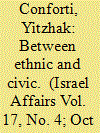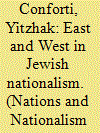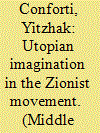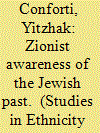| Srl | Item |
| 1 |
ID:
107911


|
|
|
|
|
| Publication |
2011.
|
| Summary/Abstract |
This article addresses two basic issues of the Zionist vision: 1. Was the Jewish state planned as an ethnic or civic state? 2. What was the character of the Zionist vision? Was it a holistic utopian vision, or a minimalist vision for creating a Jewish national state? This research concludes that the state of Israel, which developed from a nationalist ethnic-cultural movement, integrated within it ethnic values as well as Western civic values. The founders of the central wing of the movement all aspired to create a Jewish national state that upheld these values. Furthermore, the planning of the Zionist Utopia by the central group of the Zionist leadership was usually realistic and minimalist, not holistic. This position enabled the leadership to strike a balance between vision and reality, and to address the historical circumstances on the path toward establishment of the state.
|
|
|
|
|
|
|
|
|
|
|
|
|
|
|
|
| 2 |
ID:
095094


|
|
|
|
|
| Publication |
2010.
|
| Summary/Abstract |
This article analyses the ethnic and civic components of the early Zionist movement. The debate over whether Zionism was an Eastern-ethnic nationalist movement or a Western-civic movement began with the birth of Zionism. The article also investigates the conflict that broke out in 1902 surrounding the publication of Herzl's utopian vision, Altneuland. Ahad Ha'am, a leader of Hibbat Zion and 'Eastern' cultural Zionism, sharply attacked Herzl's 'Western' political Zionism, which he considered to be disconnected from the cultural foundations of historical Judaism. Instead, Ahad Ha'am supported the Eastern Zionist utopia of Elchanan Leib Lewinsky. Hans Kohn, a leading researcher of nationalism, distinguished between 'Eastern' and 'Western' nationalist movements. He argued that Herzl's political heritage led the Zionist movement to become an Eastern-ethnic nationalist movement. The debate over the character of Jewish nationalism - ethnic or civic - continues to engage researchers and remains a topic of public debate in Israel even today. As this article demonstrates, the debate between 'Eastern' and 'Western' Zionism has its foundations in the origins of the Zionist movement. A close look at the vision held by both groups challenges Kohn's dichotomy as well as his understanding of the Zionist movement.
|
|
|
|
|
|
|
|
|
|
|
|
|
|
|
|
| 3 |
ID:
192274


|
|
|
|
|
| Summary/Abstract |
This article examines the last utopian novel of early Zionist thought and literature. The utopia Jerusalem Rebuilt was written after the First World War and published in the mid-1920s by Boris Schatz. This work combined artistic utopian vision and Jewish nationalism, and it reflected the early Zionist vision at the turn of the twentieth century. This article discusses Schatz’s work against the backdrop of Zionist utopian literature that was written between the 1880 s and the end of the First World War. The article suggests that a careful reading of early utopian Zionist literature points to the clear connection between the revolutionary Zionist vision and pre-modern Jewish cultural heritage. Despite the revolutionary character of Zionism, the early utopian literature points to the evolutionary and cultural dimensions of Jewish nationalism.
|
|
|
|
|
|
|
|
|
|
|
|
|
|
|
|
| 4 |
ID:
194105


|
|
|
|
|
| Summary/Abstract |
The Bible’s central position in the Zionist movement is well-known. Most previous studies on this topic have focused on Israeli society following the establishment of the State of Israel. By contrast, this article focuses on the role of the Hebrew Bible in Jewish nationalism and early Zionist thought from the 1880s to 1948. This article examines the connection between Zionism and the Bible in the context of modern nationalism research from a cultural approach. The focus on the Bible gave Zionism the components it lacked: territory and language. Unlike other ancient Jewish texts in which national aspects were marginalized, the Bible set a model for the creation of a modern nation-state. To the Zionists, the Bible was a guide to forming the ‘New Jew’. This article shows that examining the relationship between Zionism and the Bible enables better understanding of the pre-modern cultural foundations of the Jewish national movement.
|
|
|
|
|
|
|
|
|
|
|
|
|
|
|
|
| 5 |
ID:
113025


|
|
|
|
|
| Publication |
2012.
|
| Summary/Abstract |
Since the 1980s, the question of how nations are formed has been the topic of historiographic debate: is it correct to define nation-building in terms of inventing traditions, or is the ethnic-symbolic viewpoint more useful in understanding the process of development of the nation-state? This debate is also reflected in research on Jewish nationalism. In this article, I will examine this issue in relation to the Zionist movement, focusing on several clear examples of forging the nation and nation-building: 1) the change in configuration of traditional Jewish holidays; 2) ceremonies and Zionist holidays on kibbutzim; 3) the status of the Bible in the Zionist movement; and 4) Jewish history and Zionist historiography. These examples indicate that the process of nation-building reveals a strong ethnic-cultural link to the Jewish past. I will argue that modern political explanations such as inventing tradition do not offer a full explanation of the phenomenon of Jewish nationalism. In order to arrive at a comprehensive understanding of the success of Zionism in consolidating around it a group willing to commit such a high level of personal sacrifice over time, we must give consideration to cultural-ethnic continuity as well as the feeling of commitment and sanctity that Jewish nationalism offered to its believers, both religious and secular.
|
|
|
|
|
|
|
|
|
|
|
|
|
|
|
|